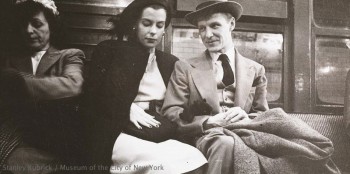The modern notion of chivalry (in contrast to its historical roots) prescribes certain ways a gentleman should behave toward a lady. The heavily implied traditional gender roles within this code of conduct can cause discomfort in feminist spheres. I don’t need a man to open a door for me or pull out my chair at the dinner table. Nonetheless, a rejection of an antiquated rulebook doesn’t mean there’s no place in society for a little kindness.
Regular subscribers to Curiata.com will know we recently spent some time in New York City covering the Tribeca Film Festival. Well, in reality, the hubs covered the film festival while I did other fun things, like check out the exhibits at the Museum of Moving Image in Queens, visit great coffee shops like Kaffe 1668 in the Financial District (their mascot is a sheep!), and hang out at La Casita Yarn Shop over in Brooklyn.
Over the course of the weekend, I had many opportunities to reflect on the interactions of the vastly diverse population of the largest metropolis in the country. There is no greater equalizer in New York than the subway. Nonetheless, there are rules of etiquette, some written, some not, that have become woven into the social contract of sharing such a small, enclosed space, hurtling at high speeds, with hundreds of your closest friends.
Despite having a rigorous festival schedule, Mike and I still made time for breakfast in the morning and a very late dinner. On Saturday morning, we boarded a relatively busy downtown subway to Chelsea. The train seats were full, so I had to stand. Normally, this doesn’t bother me; I don’t expect anyone to give up their seat for me. I am an able-bodied, healthy, non-pregnant female. As a good, equality-loving feminist, I do not think I am entitled to a seat just because I am a woman. In fact, not 24 hours before, I had relinquished my seat to a lady who was very pregnant and looked extremely uncomfortable in any position she was in.
Two seats opened up at the next stop, and two young men, I’d say between 18 and 25 years old, practically ran to fill the seats. I was slightly annoyed that they didn’t even look around to see if there was anyone else who might need those seats instead. The gentleman I was standing in front of saw the whole thing happen; he looked up at me, stood, tapped me on the shoulder, and told me to sit down.
This man appeared to be close to or in his 50s, and I would have never expected him to give up his seat for me. I thanked him, but said it wasn’t necessary — I could stand. He insisted, saying he “needed to stretch [his] legs anyway.” Not wanting to make a scene or be rude, I slid into the seat and pondered what had just happened.
Karma has a way of working itself out. At the very next stop, a family of five boarded the train. The three children were young but too big to be in a stroller. I’d say they were between the ages of 5 and 9. They stepped onto the train and stood in front of the two ruffians who almost mowed me over to get to those seats. As the train departed the station, the littlest one was having a hard time standing on a moving subway. (In her defense, it is a very hard skill to master, and I’m still amazed by the people that don’t need to hold on to the bar and are instead in some mystical “rail surfer” stance.) The mom stared down the two guys in the seats so hard that they finally succumbed to mom powers and gave up their seats for the kids.
All of this is a long way of saying: just because I’m a feminist doesn’t mean that I don’t expect a certain level of what some might call “chivalry.” I put that in quotes because I know there are people out there who think that these acts are just common decency, and perhaps they are right. That certainly puts me at odds with some feminists who feel the need to lecture anyone who would extend a courtesy to a woman. I’m afraid that sort of feminism only adds to the antagonism and unhappiness that brings us all down.
When someone holds a door for me, I say thank you. I’ve outgrown the need to make a statement about how “my arms aren’t broken and I can get it myself.” (On the flip side, however, if someone lets a door slam in my face, I do give them a snarky, “Thank YOU!” once I get through the door.) I think that this decency goes both ways. I will hold the door for you; I don’t care if you are male, female, or transgender.
I realize that there are rude people in this world, and let me tell you, they are everywhere. I’ve run into them in NYC, Philadelphia, Kansas, and even Curiata.com’s home base, south-central Pennsylvania. I do, however, have a suggestion. Why don’t we all just try to be kinder to one another, regardless of gender, age, race, sexual orientation, or gender identity?
Perhaps, by being polite, we may be able to move mountains on the path to equality. “Please,” “thank you,” and “excuse me” may not solve all of our inequality problems, but they sure will make the world a lot more pleasant while we try to sort it all out.
